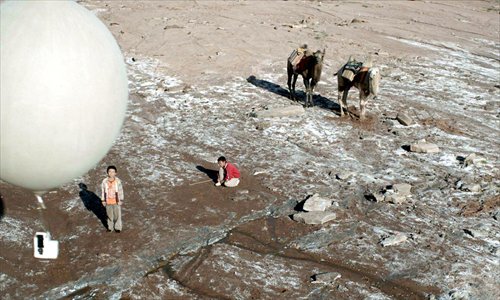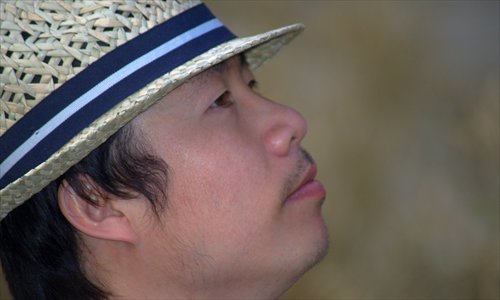HOME >> ARTS
The film 'maniac'
By Wei Xi Source:Global Times Published: 2015-10-29 21:33:01
Li Ruijun’s ‘River Road’

A still from River Road Photo: Courtesy of Zhang Min

Director Li Ruijun Photo: Courtesy of Zhang Min
Designed by American architect Steven Holl at the beginning of the 21st century, the MOMA Linked Hybrid complex is now a rendezvous for all kinds of the avant-garde, non-mainstream, and independent artistic activities in Beijing. Located within the 2nd ring road, the most commercialized and noisy area in Beijing, it still manages to exude an aura of quiet and otherworldliness.It was in a café in MOMA that I met director Li Ruijun, whose latest feature River Road premiered nationwide on October 23. Like River Road, which was nominated for the best film at last year's Tokyo International Film Festival and this year's Berlin International Film Festival, Li's previous works often gain attention at independent film festivals.
A random selection for a place to conduct an interview, MOMA and Li seemed to echo each other, both giving off a feeling of tranquility.
When I arrived, Li was still doing a phone interview, and he told me afterward that he had another two later that afternoon. "Almost three to four interviews a day," he said. However, despite the many interviews, the film is struggling at the theaters. On the fifth day after its release, there were only eight theaters in Beijing, about 30 screens around the capital city, that were showing River Road, according to the statistics from mtime.com, this while the film has a score of 8/10 on the same site and 7.7/10 on movie.douban.com.
A box office pickle
Focusing on the journey of two little boys, brothers from the Yugur ethnic minority group, looking for their home, River Road presents the sad fact that nomadic life, culture, and the environment they rely on are being destroyed, disappearing due to urbanization.
With no big stars and a little-known director, River Road has been largely neglected at the box office from the very beginning, even though domestic film critics like Wei Junzi highly recommended it on Sina Weibo on the day of the premier.
"River Road uses children's visual angel to tell the past and contemporary of a civilization. Poetic, deliberate, and sad, it is a rare work of Chinese films," Wei wrote.
Li admits that it was a situation he and producer Fang Li had foreseen. Maybe that is why there was a trailer before the national release, in which a number of stars and celebrities including novelist turned director Han Han, and Taiwan director Doze Niu all joined in the promotion of the film.
Nevertheless, River Road remains rare showing in domestic theaters. It earned 150,000 yuan ($23,580) at the box office on the first day, and 644,000 yuan after four days. "The percentage of shows each day is around 0.3 percent," Li said. What he had not expected was that cinemas would be unwilling to showing his film.
""I know the theater managers have their pressure [making the biggest profits for the company], but why not just give River Road a try?" Li said, adding that the crew behind River Road has of late been receiving a lot of requests from moviegoers wanting to see the film.
To minimize risk, many film companies in China prefer to repeat a previously successful model rather than to introduce a completely new one. For example, when nostalgic youth romance film You Are the Apple of My Eye became a surprise hit in 2011 similar works come out every year. And when the comedy Lost in Thailand made a heavy box office in 2012, similar projects were set up under Lost title, including this year's Lost in Hong Kong and an upcoming Lost in India in 2016.
Believing that creativity and commercial value need not be opponents, Li holds the opinion that what brings uniqueness and originality, rather than copied or formulaic products, should carry the biggest commercial benefit. "At least, having a variety of film genres is not bad for the market," he said.
Shining a light
Li,32, was born in Northwest China's Gansu Province, in a town where few people had studied majors like directing and filmmaking. He recalled being told by his teacher that his chosen college major, film and television advertising, was "in high favor" suggesting it would be easy for him to get a job afterward. It very well have been so at the time, but Li's journey has been far from a smooth one.
Following the major trend of going to Beijing, Li settled down in a bungalow of less than 20 square meters in the capital. "I just moved from the bungalow recently, which I had lived in for about ten years," Li told the Global Times, adding that though the living condition was poor, he enjoyed the convenient transportation and the sense of familiarity.
While not very scrupulous about his personal situation, Li cares a lot about the circumstances surrounding the making his films. An early interview from 21ccom.net reported that Li had made budgets on the amount of money a meal for each crew member would cost and even calculated oil usage to rent a more economical bus.
Admitting he had been a "mean" person in that regard, Li joked that the bus driver even mistook him for a producer and tried to bribe him to collect a higher service fee.
Today Li can breathe a little easier on the financial front; he has Fang, but back then he had to scrape together funds from family and friends. His earlier works like The Summer Solstice (2006) and The Old Donkey (2011) were all made in this way.
Reflecting on the challenges he faced earlier on, Li found it hard to explain his dogged persistence in filmmaking. "It is the way I came to learn the world," Li told the Global Times after thinking for some time.
Taking River Road as an example, Li said that growing up in a place where only a desert separated him from the Yugur ethnic group, and seeing how different they were in their dress and mannerism, he was very curious about them.
"[Today] you cannot tell the difference even if they are stand next to you," Li said, noting that culture is dying. Only 14,000 people remain about 90 percent of which cannot speak their native language.
"Maybe in many people's eyes, I am just a maniac because the dying out of the ethnic group does not directly affect me," Li said, explaining that he wants to call people's attention to the dying cultures, which may be indirectly caused by us.
Posted in: Film